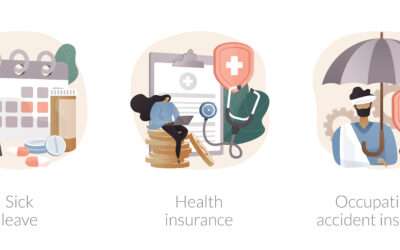42 C.F.R. Part 2 Final Rule Amending Privacy of Substance Use Disorder Records Released.
The Final Rule amending 42 CFR Part 2 finalizes changes that will align uses and disclosures of Part 2 information with HIPAA for treatment, payment & health care operations. Part 2 providers and others who must comply with Part 2 and this Final Rule have two (2) years to get into compliance. Read more about the changes and how we can help with compliance.
Meet New Jersey’s Brand New Data Privacy Act and Its Impact on Healthcare Organizations & Others
The New Jersey Data Privacy Act (NJDPA) was enacted on January 16, 2024. Although PHI collected by a HIPAA CE or BA is excluded from the NJDPA HIPAA CEs and BAs are NOT wholly excluded from compliance with the NJDPA. Also, HHS’ recent problematic interpretation that IP addresses collected by a healthcare provider’s website may be PHI adds even more complexity in interpreting the NJDPA.
When AI Denies Your Healthcare: The UnitedHealthcare Lawsuit and the Legal Dangers of AI in Medicine
icial intelligence (AI) is supposed to make healthcare smarter, more efficient, and—ideally—better for patients. But as UnitedHealthcare Group (UHG) recently learned, AI can also go horribly wrong, leading to denied care, regulatory scrutiny, and class-action lawsuits. Today’s posts breaks down what happened in the UHG case, what it reveals about some of AI’s legal minefields, and how healthcare organizations can avoid becoming the next target of an AI-related lawsuit.
American Hospital Association Sues HHS for its HIPAA Online Tracking Guidance
The American Hospital Association, joined by a few others, has sued the federal government to enjoin them from enforcing their published Guidance on “Use of Online Tracking Technologies by HIPAA Covered Entities and Business Associates.”
Hefty Monetary Disincentives Proposed for Health Care Providers Engaged in Information Blocking – But Not Every Provider Is on the Hook.
The Proposed Rule for enforcement is out, and the potential financial “hit” that health care providers may face if the OIG finds them to have violated the Information Blocking Rule (IBR) could be substantial, but don’t get spooked. The reach of the proposed enforcement has limitations. Read more to find out why.
Is Your Organization Paying for the Cost of Health Care? You Might be Responsible for a Health Plan with HIPAA Compliance Obligations.
OCR reaches a new $1.3 million dollar settlement with a health plan for HIPAA violations. OCR says, “HIPAA-regulated entities need to be proactive in ensuring their compliance with the HIPAA Rules, and not wait for OCR to reveal long-standing HIPAA deficiencies.” Employers that offer Employee Benefits must evaluate if they are responsible for a health plan with HIPAA compliance obligations.
Penalties for Violation of the Information Blocking Rule Start Today!
OIG’s authority to begin enforcement of the Information Blocking Rule begins September 1, 2023. Certain Actors subject to the Information Blocking Rule may be subject up to a $1 million penalty per violation! Actors need to be proactive in ensuring their compliance with the Information Blocking Rule and not wait for the OIG to discover them.
WEBINAR: Managing Risk with Online Tracking Technologies
Attorneys at Oscislawski LLC together with the New Jersey Hospital Association present this highly informational Webinar on compliance steps hospitals can take to attempt to manage the risks associated with use of technologies that include online tracking tools.
Genetic Testing Company Violates Privacy and Security Policies, FTC Says.
Genetic testing companies, and those who partner with them, must take care to ensure that the scope of how consumers’ sensitive data is used and shared in the future aligns with the scope of consent that was granted by the consumer at the point of collection. The FTC found that a California-based genetic testing company informed consumers that it would only share consumers’ sensitive health and other personal information “in limited circumstances,” but then expanded sharing such information with new third parties, like supermarket chains. The FTC has now stepped up to protect consumers’ sensitive genetic information.
American Hospital Association Sues HHS for its HIPAA Online Tracking Guidance
The American Hospital Association, joined by a few others, has sued the federal government to enjoin them from enforcing their published Guidance on “Use of Online Tracking Technologies by HIPAA Covered Entities and Business Associates.”
Hefty Monetary Disincentives Proposed for Health Care Providers Engaged in Information Blocking – But Not Every Provider Is on the Hook.
The Proposed Rule for enforcement is out, and the potential financial “hit” that health care providers may face if the OIG finds them to have violated the Information Blocking Rule (IBR) could be substantial, but don’t get spooked. The reach of the proposed enforcement has limitations. Read more to find out why.
Is Your Organization Paying for the Cost of Health Care? You Might be Responsible for a Health Plan with HIPAA Compliance Obligations.
OCR reaches a new $1.3 million dollar settlement with a health plan for HIPAA violations. OCR says, “HIPAA-regulated entities need to be proactive in ensuring their compliance with the HIPAA Rules, and not wait for OCR to reveal long-standing HIPAA deficiencies.” Employers that offer Employee Benefits must evaluate if they are responsible for a health plan with HIPAA compliance obligations.
Penalties for Violation of the Information Blocking Rule Start Today!
OIG’s authority to begin enforcement of the Information Blocking Rule begins September 1, 2023. Certain Actors subject to the Information Blocking Rule may be subject up to a $1 million penalty per violation! Actors need to be proactive in ensuring their compliance with the Information Blocking Rule and not wait for the OIG to discover them.
WEBINAR: Managing Risk with Online Tracking Technologies
Attorneys at Oscislawski LLC together with the New Jersey Hospital Association present this highly informational Webinar on compliance steps hospitals can take to attempt to manage the risks associated with use of technologies that include online tracking tools.
Genetic Testing Company Violates Privacy and Security Policies, FTC Says.
Genetic testing companies, and those who partner with them, must take care to ensure that the scope of how consumers’ sensitive data is used and shared in the future aligns with the scope of consent that was granted by the consumer at the point of collection. The FTC found that a California-based genetic testing company informed consumers that it would only share consumers’ sensitive health and other personal information “in limited circumstances,” but then expanded sharing such information with new third parties, like supermarket chains. The FTC has now stepped up to protect consumers’ sensitive genetic information.
AHA Writes Letter to HHS and Pushes Back on OCR’s Online Tracking Guidance
After OCR created a Morton’s Fork for hospitals and health systems by publishing its HIPAA Guidance on the Use of Online Tracking Technologies, the American Hospital Association initially stayed out of the fray. Not any more. In its letter dated May 22, 2023, AHA makes its case to HHS as to why OCR’s Online Tracking Guidance should be suspended or amended.
FTC Finds that Ovulation Tracking App Violated the Health Breach Notification Rule
The FTC releases its second enforcement action under the Health Breach Notification Rule in just over 3 months. This time, the FTC found that a fertility app called Premom shared sensitive fertility information with third parties for unauthorized purposes. While Premom told its users that it would not share their health information with third parties without users’ consent, it used third-party automated tracking tools known as software development kits (SDKs) which shared highly sensitive health information (e.g., data about an individual user’s sexual & reproductive health, pregnancy status etc.) for advertising and marketing purposes.
ONC Says “Vetting” Mobile Apps is Information Blocking
ONC says actors that require third-party apps to be “vetted” by them for security reasons before allowing patients to use such apps to receive EHI via API technology certified to the Standardized API certification criterion is likely to be information blocking. However, my concern with relying solely on the security criteria required for API certification is that it is too low of a bar to adequately protect patients and other individuals from developers of apps that fail to keep promises to keep individuals’ information confidential.
ONC Publishes New FAQs on Information Blocking focused on the Privacy Exception.
The Office of National Coordinator says it receives a lot of questions regarding how the Information Blocking Rule is supposed to work in tandem with the HIPAA Privacy Rule and other federal and state laws governing privacy and confidentiality. Their new FAQs aim to help clarify when actors can choose to not respond to a request for access, exchange, or use of electronic health information.
ONC Vindicated. Patients Want Immediate Access to Test Results
JAMA published a study earlier this week finding more than 95% wanted immediate access to test results. However, when speaking to ONC, the study’s lead researcher specifically noted that although 95.3% of patients who received abnormal test results responded that they still would like to continue to receive immediately released results, this was associated with nearly twice the likelihood of worry compared to respondents who received normal results.
FTC Orders BetterHelp Health App to Pay $7.8M for Sending User Data to Facebook & Snapchat
The FTC issued a proposed order requiring BetterHelp to pay $7.8 million to consumers to settle charges that it shared consumers’ health data with Facebook, Pinterest, Snapchat, and Criteo after promising to keep such data private and claiming it is “certified” as “HIPAA compliant.” The real juice of this case is in the FTC compliant — and HIPAA-covered providers, facilities & organizations can learn a lot about what to watch out for with health data Apps as we continue to march towards the FHIR.
Subscribe & Survive the onslaught of new healthcare regulations requiring updates to affected compliance programs.
Get access to exclusive subscription-only access to resources, tools, industry analysis and other valuable solutions.

















